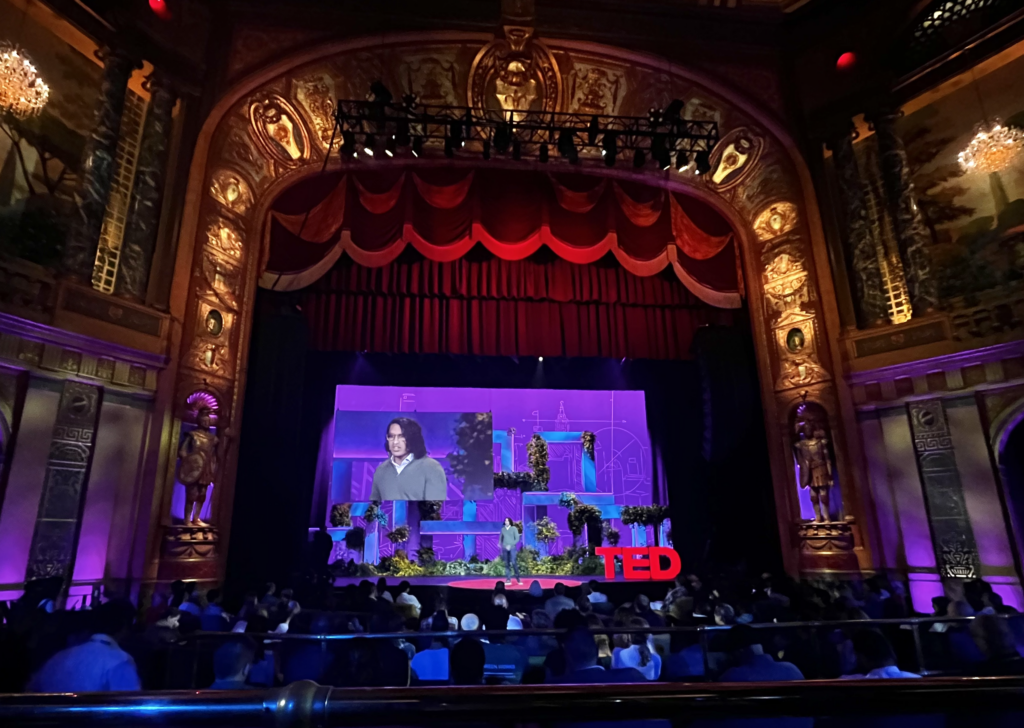TED Countdown Summit – Detroit

Last week, over 800 global innovators business executives, scientists, policymakers, next-generation leaders, artists, activists, and more convened in Detroit to explore solutions, tools, and partnerships needed to drive climate action at speed and scale. This invite-only, four-day event was the second TED Countdown Summit and participants represented 60 countries. Founded in 2020 by TED and Leaders’ Quest, TED Countdown is a global initiative dedicated to accelerating solutions to the climate crisis and building a cleaner, healthier, fairer future for all. Venues included The Fillmore Detroit, Michigan Central, and over 30 “Quest Visits” in and around Detroit. Lindsay Levin, head of partnerships and impact for TED, said there were three desired outcomes for the event. First, we need to change the story. This is a subject that people tend to feel hopeless about and unempowered. This is not true. We all have the power to create change together. Another hope is that the individual TED talks accelerate ideas, reach millions, take hold, and take off. The third is to spark collaboration between people who may not have met otherwise and who may find partnerships or ways to work together to create change. The summit included a special session called “Renewal.” It included live TED Talks and performances featuring the following: Al Roker – “Today Show” weatherman and environmentalist Cynthia Williams – Global director, sustainability, homologation & compliance, Ford Motor Co. Neil Vora, MD – Pandemic Prevention Fellow, Conservation International Ludmilla Rattis – Ecologist Louise Mabulo – Founder, The Cacao Project David Lammy – Shadow Secretary of State for Foreign, Commonwealth, and Development Affairs, United Kingdom Justin J. Pearson – Member of the Tennessee State House of Representatives Tunde Olaniran – Musician from Flint, MI SBN Detroit was in attendance, and we recap key takeaways here: Roker: We’ve had so many extreme weather events being fueled by climate change over the last handful of years. From 2016 to 2019, there were four category 5 hurricanes, which is unprecedented. There has been a significant increase in EF2 tornados (111-135 mph gusts) in the Midwest and Southeast in areas with larger populations. When it comes to wildfires, the average acreage burned in the warm season has nearly doubled. Roker: The Intergovernmental Panel on Climate Change (IPCC) estimates in the next thirty years 140 million people will be displaced worldwide due to climate change. Roker: What can we do? Switch to electric vehicles,, electric leaf blowers, lawnmowers, etc. Rethink our lush lawns and switch to drought-resistant indigenous plants. Rethink “fast fashion” that’s filling our landfills. Engage. Vote for local officials who support climate change action. Williams: With the electric vehicle revolution comes unprecedented change in the areas of capacity and collaboration. We need to collaborate in ways we’ve never done before. Williams: The F-150 Lightning can power a house for up to ten days. Imagine the impact on rural communities if they didn’t need a generator when the power goes out. It can light and heat a campsite or work area; it can supercharge a tailgate party; and even charge another EV. Williams: We need to build more infrastructure around EVs. It’s critical. We need charging stations as plentiful as gas stations. There are 145,000 gas stations in the U.S. and 23,000 fast charging stations. We need every community to have access to charging. Williams: Ford has launched 110K EVs since 2021 with the potential to save five million tons of carbon emissions over their lifetime and 600 million gallons of gas. Williams: To be ready for the EV future, we need policymakers to harmonize regulations; we need one framework from which to work; we need to strengthen the supply base and create more jobs locally; and we need to collaborate. As a person who’s dedicated my career to sustainability, I feel that the road ahead is paved with promise. But it’s not about Ford versus GM – we all have to work together to build a better future for the next three generations and beyond. Vora: Pandemics can be traced to animals, and it’s happening because of what we humans are doing: Clearing the tropical forests. Vora: Climate change is the greatest threat to human health we have today. Vora: Human health, animal health, and environmental health do not stand alone. They are one and the same. And we need to sustain the ecological balance we all depend on to sustain this health. Rattis: In South America and Brazil, tapirs eat fruit and then spread seeds that is in their waste. In one waste, there can be 733 seeds belonging to up to 24 species. Then the seeds become deep-rooted and drought-resistant trees. Dung beetles also help disperse the seeds in the forest. The forests there depend on this; our future is intertwined with the future of those animals, and we need to protect them. Pearson: I grew up in Memphis, Tenn., and at one point there were plans to install a multibillion-dollar pipeline that would take over land and taint the drinking water, and basically destroy communities. We fought against this and won. This is where I learned that when we fight together for the common good – we can win. Pearson: We need leaders and first followers. First, followers who are people who help build movements and show others how to follow. The institutions do not create change, it’s the people who mobilize. Lammy: We are in a moment where the climate change emergency is moving into the mainstream – it’s the corner of our economy and prosperity. Mabulo: Maybe the solution to climate change isn’t one big amazing solution. Maybe it exists in the soil under our feet. Be sure to subscribe to our newsletter for regular updates on sustainable business practices in and around Detroit.


